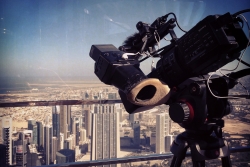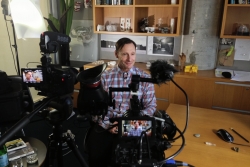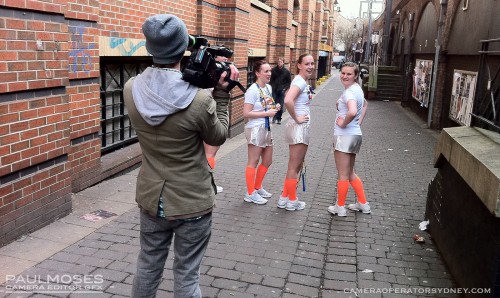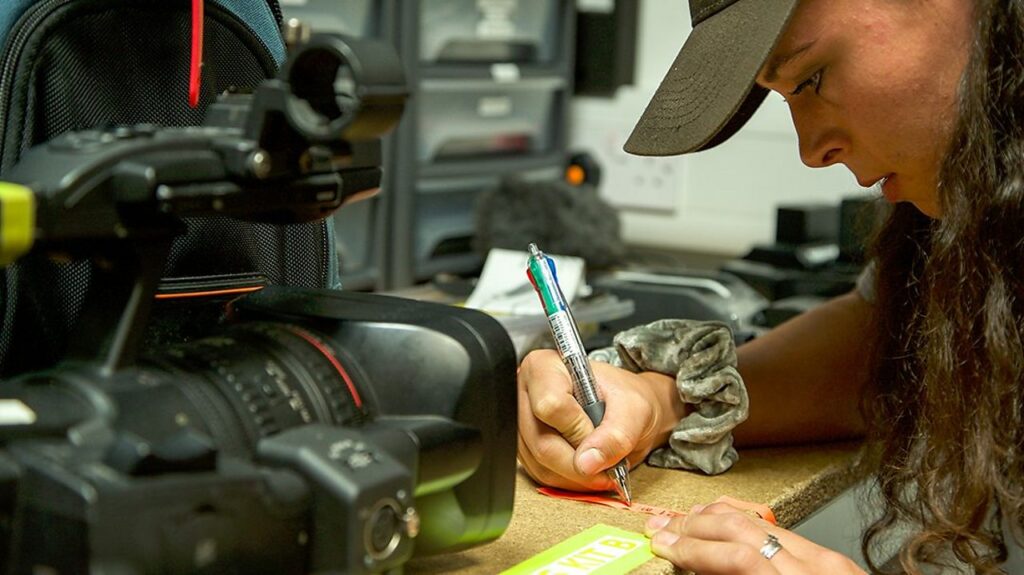lessons I’ve learnt since becoming a freelance cameraman
I have been wanting to write an article like this for a little while now, and seeing as it’s raining outside and I have no shoots on, today seems like a good day to do it!
There are loads to resources to provide ideas and hints on the best ways to prepare yourself before throwing in the nice, secure, full-time job in the video production industry and going out into the scary world of freelancing – this article is meant to be just a small collection of tips that I have learnt over the last 3 years and how they have helped make my life easier.
Before starting cameraoperatorsydney.com I was a full-time staff cameraman & editor for around 6 years at TV stations here in Australia, as well as a few years working for a production house in London. My full-time experience proved to be invaluable experience and a way of gaining a solid set of skills behind the camera, directing and seeing the end-to-end video project journey.
Towards the end of the trip, and with hours and hours of time on the bike to think about what I wanted to do, the thought of going freelance started to take shape in my head. The beauty of traveling is that by taking yourself away from your normal life you get a fresh perspective and confidence of what you can do next.
The only bit of gear I had was a Sony A77 DSLR I had bought to take video on the cycle trip and a few lenses so I knew I would need to buy a few things. Upon returning to London I set about on day one of being a freelance cameraman – with hardly any camera equipment, minimal contacts and not a clue how to run a business, but I had enough saved to give it a go for a few months!

THINGS VIDEO EDITORS WISH THEY COULD SAY TO CAMERA OPERATORS AND DOPS
As any experienced editor will tell you, after years of sifting through hours and hours of footage (some of it good, some of it bad, some of it very ugly), there are a few key things that anyone working behind the camera can do that make our lives much easier, the project far better, and the final result something we can all be proud of.
Of course, it’s very easy for editors to turn into armchair critics. They didn’t get up at 5 am to make the sunrise or drag heavy gear half way up a mountain, battling the elements just to get the perfect shot. But we do have the benefit of the perspective gained by leisurely skimming through the results of your hard graft. So here are 11 suggestions for things every editor wishes every camera operator always did, and hopefully they’ll improve what you get in the can, and improve the life of editors everywhere.
Shoot for the edit – Think in terms of sequences and storytelling. Make sure you’ve got an establishing wide, an interesting reveal, close ups, movement etc. If an interviewee mentioned a specific location, item, or view, try to grab that if you can. Also think in terms of triplets. Three shots most often make for a nice sequence of cutaways – two, not so much.
Always roll – It’s the ‘bad bits’ that we often use – re-focuses, lens whacking, snippets of background audio for filling in silences, etc. – so please don’t wave your hand in front of the camera to say that it’s no good. We might have a use for it anyway.
Don’t always roll – Editors don’t love it when they have to copy, ingest, transcode and organise lots of footage that then turns out to be someone’s feet, the inside of a car door, lens caps or other random things. Obviously, this isn’t intentional, but if you know it’s happened, please weed out the clip if you can.

Advice to Producers on hiring Camera Operators
First of all, this does not refer to single person camera operation but to the world I inhabit; the world of the camera crew: Camera Operator, 1st AC (Focus Puller), 2nd AC (Clapper/loader), grip and DIT.
I am a camera operator. A few years ago I was lucky enough to be invited to join the ACO (Association of Camera Operators), the UK’s equivalent of the SOC; so I know a thing or two.
I keep seeing posts for camera operators saying “must have experience of Epic” or must have experience of Black Magic” etc. Specifying a particular camera. This is a condition that should be placed on the Focus Puller, not the Operator. You do not need to specify knowledge of any particular camera when advertising for an operator.
It is the Focus Puller, that needs to know a particular camera. It is the Focus Puller who builds the camera at the start of the day, physically navigates the menus to set the camera up, maintains the camera through the day, makes any modifications to it that are required for a particular shot and then brakes the camera down at the end of the day.
The Camera Operator frames all the shots. He/she does this by operating Geared heads, fluid heads, remote heads, handheld, steadicam, Movi etc. He does not have to know anything specifically about the camera, just how to frame the shots using the methods described above. The Focus Puller is the guy who actually looks after the camera.

camera operator
What is your job?
I am a camera assistant and I help to make films and TV shows by running a camera and making sure it doesn’t run out of battery or memory on set. I use the clapper board to show the start and end of a scene. I also show the actors where to stand by putting marks on the floor, so that they are framed by the camera properly. I use a computer to find out about how new cameras work, to watch videos made by other people that I can learn from, and to save and store everything that we film
What inspired you?
I took Film Studies at school and it was amazing. We would make films in class and I had to write a script and got marked 45/45. I was so proud.
Best thing about your job?
I am lucky that I get to travel with my work. I have been in a helicopter twice! I’ve even been on a horse because of my job, and I get to meet interesting people (and once some foxes) that come into the TV studio or set to be filmed.
Top tips
Try things. Trying things is where you find out what you like and what you don’t like. If you don’t try things, you will never know what you are good at!
What to expect if you want to become a camera operator
Camera operator salary: Variable on different contracts. Recommended rate of £42 per hour minimum (BECTU 2017). BECTU is the UK’s media and entertainment trade union (Broadcasting, Entertainment, Communications and Theatre Union)
Camera operator working hours: Hours can be long and unpredictable. BECTU recommends a maximum of 48 hours per week

WOMEN BEHIND THE CAMERA
“I started out as a camera trainee in 1986 through a scheme set up by the ACTT (then the main union of the industry), that intended to bring more women and ethnic minorities into the film industry,” says Bristow, who has worked in the camera department for more than 30 years, “I worked my way up the camera ladder on features and TV dramas to become a camera operator, and by 2009 was the only full female member of the Association Of Camera Operators. There are about 110 male camera operators in the ACO.
“In 2016, Pete Cavaciuti ACO, president at the time, asked me to write an article about why there are so few female camera operators. I began by looking at how many women there are in all the different grades within the camera department and started to create a database. I realised that, for anything to change, it is important to show female 1st and 2nd ACs that camera operating is a viable career choice for women.
“Producers, directors and DPs are now actively thinking about the importance of increased diversity within the crew. Our aim is to increase equality in the camera department by being more visible,” says Szeliga. “Now there’s one platform that will provide the contact details of women in every grade of the camera department, including the electricians, DITs, video ops and grips.”
The response from DPs within the BSC has been very positive. “Things are changing in the camera department,” said BSC president Mike Eley BSC. “But we have still got a long way to go. We are starting from such a low base that I believe it is the responsibility of all DPs to ensure their department is diverse in personnel. A mixed crew is good for the actors, good for the director, and therefore good for the film.”
WBTC is also about up-skilling and encouragement. In June 2019, the first workshop was held, on geared and remote head operating. Twelve women, mostly 1st ACs or operators, were given the opportunity to spend a day practising with a 50ft Technocrane in one part of a stage at Warner Bros. Studios Leavesden, and on an ARRI head, dolly and track in another part. The workshop was made possible by the support of the ACO’s Sean Savage and Phil Sindall (who agreed to tutor and support the workshop), Panavision (who provided the camera and grips equipment), and Warner Bros. (who provided the space).